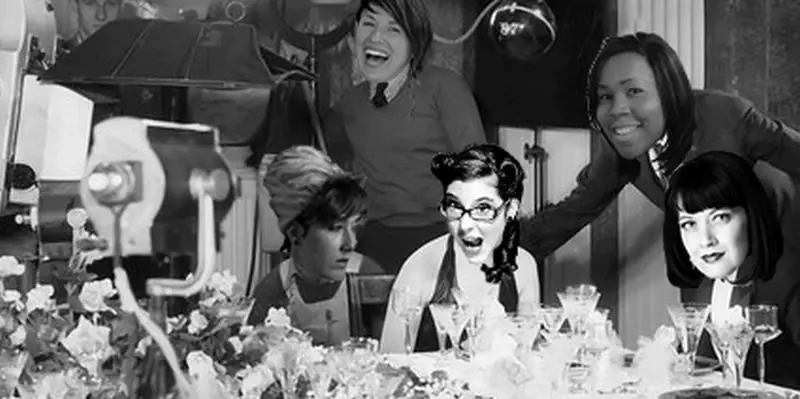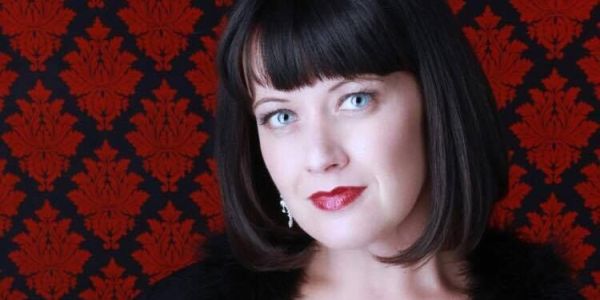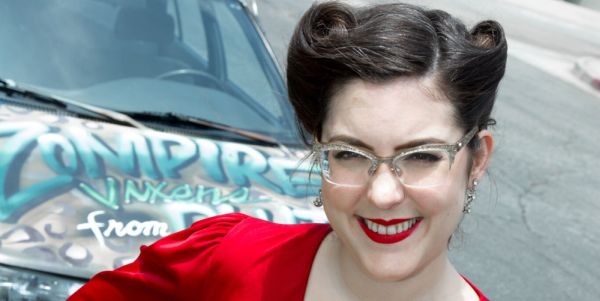“Communication Is Key To Shattering The Glass Ceiling” – Interview With Dinner With Dames Program Director & Filmmaker Jenna Payne

Manon de Reeper is the founder and CEO of Film…
On Thursday, September 22, Blair Witch writer Simon Barrett is hosting the very first Dinner With Dames (DWD). Organised by Jenna Payne in collaboration with Cinefemme, it’s an opportunity for a group of up-and-coming women filmmakers to enter a dialogue about diversity issues and obstacles women face in the entertainment industry, while enjoying a meal. High level industry players are invited to every dinner, in an attempt to break down the barriers of access, help demolish the myths about female filmmakers and to promote more conscious hiring practices in Hollywood.
I spoke with Payne, who explains a bit more about how Dinner With Dames came to be and its purpose, and what the first of the monthly dinners is going to be like, with Barrett hosting. Future dinners will be hosted by Zoe Bell (actress and stuntwoman – The Hateful Eight), Brandon Blake (entertainment attorney), Dean Cundey (Cinematographer – Jurassic Park), Paul Feig (Director – Ghostbusters), Jessica Sharzer (writer and producer – Nerve), Elvia Van Es (Vice President of Development at TLC) and many more.
Manon de Reeper for Film Inquiry: I love the idea of DWD. Can you tell me a little about how it came into existence?
Jenna Payne: Los Angeles is nothing if not a city of networking. I’ve attended many terrific women’s networking opportunities in film and hatched plans with some fantastic ladies.
At one of these mind meldings, Jen McGowan of Film Powered and director of Kelly & Cal mentioned that USC’s grad program offered a dinner for five of their graduates with an industry titan, usually USC alumni. I thought it was a fantastic idea, wanted to retool it to help propel women in the industry, and found a great partner with Cinefemme.
For those who haven’t heard of it before: What is Cinefemme? How do they help women in the film industry?
JP: Cinefemme is a 501c3 non-profit dedicated to helping women filmmakers and artists achieve their goals founded by filmmaker Michelle Kantor. Cinefemme offers fiscal sponsorship to fund projects and will be launching some new programs over the next year that will provide even more support, resources, and networking to women in the arts. I’m very excited to be collaborating with them for Dinner with Dames and am a fiscal sponsoree with my Appalachian Godfather series ‘Shiner.

What is the purpose of DWD?
JP: I see Dinner with Dames (more info) as a mentorship program for up and coming writers, directors, producers, and department heads that offers women a chance to learn from someone who has already climbed up the ladder, male or female. The program also functions as a kind of ambassadorship to the upper rungs of Hollywood to showcase that women are smart, talented, eager to succeed, and available.
Women are not a minority in the United States. They are literally an underserved and underrepresented majority, and we’re squandering a lot of creative capital and (wo)man power by passing them over for more storytelling and behind the scenes work by mostly straight, white men.
Despite lots of networking opportunities, competitions, and a buzz around diversity in filmmaking, I watch male peers get hired by their buddies regularly, but I don’t see the same for women. I made a mental checklist of what opportunities they have that I don’t. The sad fact is that there are still so few of us making it past a first microbudget feature, achieving the title of showrunner, landing department head on a blockbuster, etc., that when the powers that be are hiring their friends, they don’t typically hire the people they don’t regularly spend time with – like women, people of color, and members of the LGBTQ community.
We have an idea of who the hosts will be for DWD. Who will the guest dames be, are they directors only?
JP: We are aiming to include writers, directors, producers, and department heads in order to bolster representation in front of and behind the camera. More women on set means a more diverse work environment and will also help a variety of filmmakers better succeed. It’s great to walk into your office and not be the only one or to feel the burden of representing an entire demographic because you are the only one.
DWD sounds a bit exclusive to me, as it’s invitation only. Why did you choose for that? How are guests selected? In the press release it says [we want to open doors for] “women who truly deserve it” – who decides who deserves it, and what makes someone deserve it?
JP: As much as I would love to include any woman who wants to be in the program, I am considering this more of a diplomatic mission than pure activism; although, I support women who take more aggressive stances on issues of parity – just not in this forum. Since we have this opportunity to honestly communicate some of the stumbling blocks women face in Hollywood, I want to include a significant number of women with a track record at least in short films and features and to keep the discussion a discussion and steer us away from an outright argument. To that end, Cinefemmes (fiscal sponsorees and volunteers) are first included in the program and then are able to refer someone who they think would be a great fit for the program.
I do wish I could make it more democratic, but if someone showed up at a dinner with a pitchfork, it would probably be our last one. Haha. We will be providing this opportunity to 6-7 women every month plus a moderator (usually myself or someone from the Cinefemme board), so we are still serving a lot of women in contrast to a variety of competitions that pit women against each other and only end up helping 1-3 after a long application process. The system isn’t perfect, and we don’t live in a meritocracy.
What do you hope the women who attend DWD will gain from the night?
JP: I’m excited to hear valuable insight from our hosts in such an intimate environment. Women at the dinner have the opportunity to ask direct questions on their projects and follow up. Panels come the closest to this kind of advice, but you usually have at least five people on the panel, a large audience, and no opportunity to follow up. This is possibly the closest you will get to a one on one mentorship without winning one of those competitions or having a direct connection. We are tempering our expectations about any direct job opportunities for the participants, but who knows?
What kind of role will the hosts/mentors fulfill, what is the purpose of them being there for the night?
JP: Our hosts are the center of the conversation, whether they’re leading it or fielding mentorship questions. Just like with our participants, we hope that the hosts come with an open mind and a lot of great work stories! We also hope that post-Dinner with Dames they’ll make an even more concerted effort to seek out women applicants whenever they’re next hiring.

What can we expect of Simon Barrett (writer of Blair Witch) as mentor/host of the first rendition of DWD?
JP: A lot of dry humor and hopefully a few horror stories. Haha. I’m actually thrilled that we’re launching with Simon. The Guest is one of my favorites, and Simon and Adam Wingard (his director collaborator) got into some hot water over their segment in the first V/H/S series. I watched it and would agree that it made me uncomfortable. There were scenes with random women being attacked in places like a parking garage and having their clothes torn off.
Instead of being defensive, Simon was the first one (and I think the only one?) to strip in his segment for V/H/S/2, which is why I’m so happy to have someone like that working with us to improve gender relations in the industry. Thanks, Simon! Everyone go see Blair Witch!
How do you feel will DWD contribute to the diversity/inequality debate?
JP: Most of all, I would like our hosts and our participants to leave with a broader perspective. We are trying to keep some more specific details inside the room, but I would love it if everyone shares some of the stories they hear over the course of the dinner with their associates. Communication and empathy are key to shattering the glass ceiling.
As a female filmmaker yourself, what has your experience been like, in the American film industry?
JP: My experience has definitely been mixed. Honestly, breaking into film is hard from men and women. The price of entry is just so high. That aside, I’ve worked with some great people and some awful people. For the sake of me still having a career, you’ll have to come to one of the dinners if you want more specific details!
Did your personal experience inspire the concept of DWD?
JP: My personal experience as a filmmaker definitely prompted me to latch onto this idea as a great alternative to the film schools and competitive programs. I think a major part of selling your work or getting funding is to get people to invest in you, but they can’t invest in you if they don’t know who you are.
Grabbing a drink with someone is a much lower pressure situation than a 15 minute speed dating-style pitch session, so I immediately found this concept really appealing and appreciate Jen McGowan sharing it. I also think it has the potential to change hearts and minds about the diversity issue on the whole.

What do you feel can individual female filmmakers do at this time to further their career, any advice?
JP: I am personally pursuing more networking opportunities, like this one, but I think there are many different ways to crack an egg. There is also a proven model for completing a series of features with a slight uptick in the budget each time. Women usually hit a bottleneck at the one million mark, though. Pick the one that works for you and commit. I hope that in ten years time we’ll be looking at a much more even playing field.
Would you be interested in attending Dinner With Dames? If you have any additional questions for Jenna, please comment below!
Does content like this matter to you?
Become a Member and support film journalism. Unlock access to all of Film Inquiry`s great articles. Join a community of like-minded readers who are passionate about cinema - get access to our private members Network, give back to independent filmmakers, and more.
Manon de Reeper is the founder and CEO of Film Inquiry, and a screenwriter/producer. Her directorial debut, a horror short film, is forthcoming in 2021.













